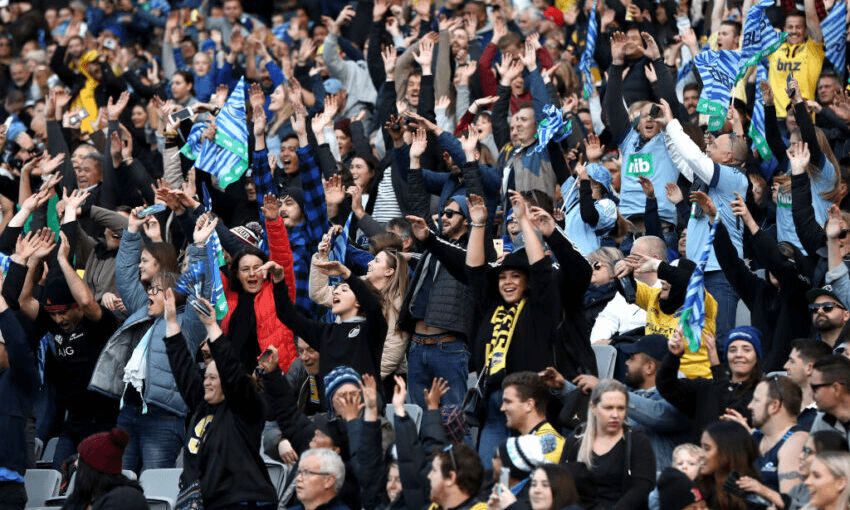In most of the world, the idea of gathering with thousands of strangers in a stadium is completely unthinkable.
Many forests have been lost to internal reviews and newspaper columns diagnosing the plight of the Blues, and how to reinvigorate the fan base, but not one of them included “appalling global pandemic”. That 43,000 filled Eden Park yesterday afternoon was a tribute to good organisation: no doubt enthusiasm was generated by Beauden Barrett’s traitorous shift north from the Hurricanes and Dan Carter’s exquisite carrying of water bottles, as well as the afternoon kickoff and free admission for kids. But more than anything, the great drawcard for the crowd was the fact there was a crowd at all.
While pockets of top-level sport have resumed in empty stadiums for football in Germany and Italy, or rugby league in Australia, at Eden Park there was no need for cut-out people in the seats or piped in sound. Yesterday Auckland hosted the world’s most attended sporting event of the weekend, by far. Next was Dunedin, which had half as many the night before. But when was the last time any sport event had more than 40,000 live spectators?
Hours earlier, crowds of thousands marched with a more serious purpose in Auckland, Wellington and Dunedin in solidarity with Black Lives Matter – and this time without any fear of breaching Covid-19 response rules. With the important exception of a mostly closed international border, and mandatory quarantine and testing for those who win exemptions, there essentially are no longer any such rules.
As the ground announcer said before kick-off, it was worth a moment’s congratulation – the sacrifices made (and those to come) had made this gathering possible. There was a special shout out to the essential workers. But how free are New Zealanders now, compared to the rest of the world?
The Blavatnik School of Government at Oxford University has been running something called a “stringency index”, which records Covid-19 measures in place across more than 160 countries, and how those have become more or less strict over time. The index score, from 1 (least stringent) to 100 (most stringent) is based on things like closure of workplaces, closure of schools and travel restrictions.
As has been noted, under level four, New Zealand hit one of the highest numbers, 96. Level three took us to 83 and level two to 36. Today New Zealand is on 22, which reflects the international border measures, and puts us essentially at the most relaxed end of the index. As other countries contemplate a sliding scale of lockdown, social distancing and gathering limitation rules – sample headline from just a moment ago, “UK PM working for all schools to open in September” – New Zealand’s eight week lockdown, and the “go hard, go early” mantra, have borne fruit.
Australia’s score is currently 53.7. The index puts Sweden, where the so-called “herd immunity” strategy has attracted considerable controversy, at 46.3. (You can explore the different index rankings here.) The only country that is comparable to New Zealand in terms of having the virus under control and relatively relaxed measures is Taiwan, also on 22. Last week Taiwan loosened distancing and mask-wearing rules at baseball games, while increasing the maximum number of spectators from 1,000 to 2,000.
It is true that New Zealand had advantages: geographical distance was once called a “tyranny”, and seeing trends arrive here weeks after other places a drawback; lately they’ve been blessings.
There is no cause for smugness: there is no certainty a vaccine will come, especially not soon. Our border measures may not prove impermeable. There is no guarantee of a trans-Tasman bubble, certainly not as long as community transmission continues there. But it’s never felt better to be lost in a crowd.

